Eating Potatoes and Losing 100 Pounds
Are you dieting? Have you heard that potatoes are off limits? No way, asserts Penn Jillette, magician, comedian, and author known worldwide for his long-running Las Vegas show “Penn & Teller” with fellow magician Raymond Teller. A couple of years ago, Penn was 330 pounds. But within four months, he’d lost 100 pounds. The star of his successful weight-loss story? Potatoes.
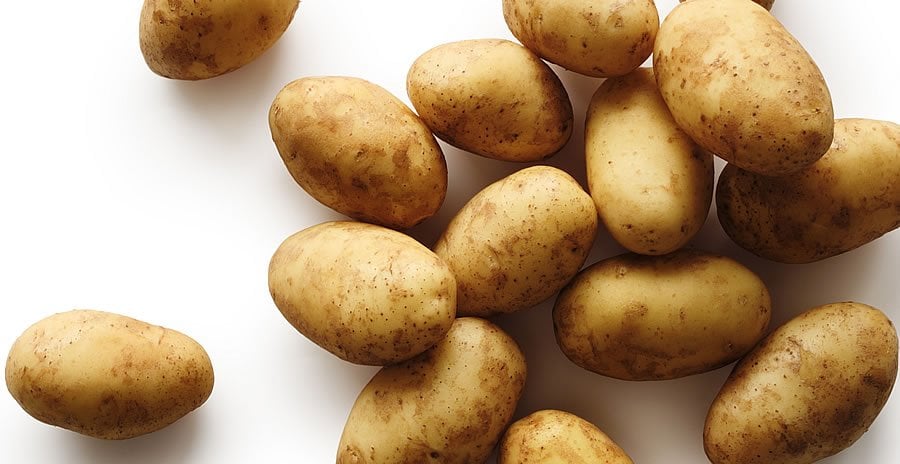
His 60th birthday wasn’t far off. But Penn Jillette was concerned that death wasn’t far off either.
The 6’6” entertainer was 330 pounds. His systolic blood pressure (the top number) was a scary 240. His coronary arteries were so clogged that he’d just undergone heart surgery.
In his newly published book Presto!: How I Made Over 100 Pounds Disappear and Other Magical Tales1, Penn describes what happened after his heart surgery. His doctor had recommended bariatric surgery to help him with losing 100 pounds, but another surgery did not appeal to Penn.
Moreover, he questioned how effective any surgery would be for his skyrocketing – and stubbornly high – blood pressure. Despite being on numerous prescription drugs, his blood pressure had remained high.
More important than chocolate cake
It was time for a total lifestyle change, he decided. That’s because overhauling his life, particularly his food choices, might help him live long enough to see his children, seven and eight years old, reach adulthood. No question about it: His kids were more important than another piece of chocolate cake.
Soon after, backstage at his Las Vegas show, Penn met Ray Cronise, a NASA scientist turned nutrition and weight-loss specialist. Ray encouraged Penn to “interrupt his current relationship with food.” He suggested that Penn pick just one type of food to consume for the next two weeks.
Potatoes
Penn chose the potato. Ray told him that he could also eat other starchy plant-based foods, like beans.
But Penn settled on the potato, and only the potato.
“That’s fine,” said Ray.
Penn really liked what he heard next. Ray told him that each day he could have as many potatoes as he wanted. He’d never have to go hungry, and he’d never have to bother with counting calories.
Losing weight without hunger
For the next two weeks, Penn ate about five potatoes a day. Just potatoes. Baked or boiled. Skin on. And those potatoes were pure. No fatty, salty toppings. No butter. No cheese. No sour cream. No bacon bits.
Just plain old potatoes.
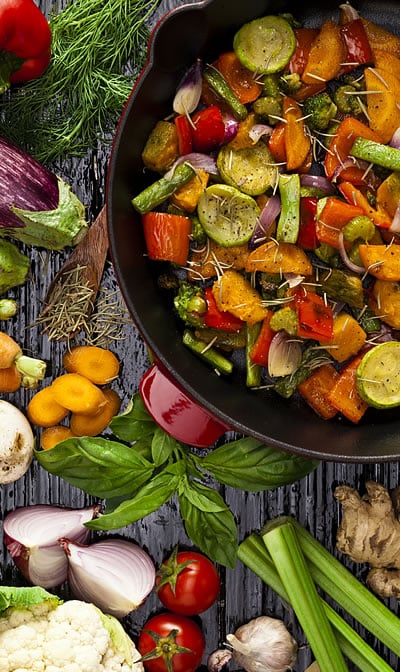
At the end of two weeks, Penn had shed 14 pounds.
Adding other whole foods
In the weeks and months that followed, he added to his potato diet other minimally-processed, plant-based meals such as salads and bean stews. Rarely did he eat animal foods like meat and cheese.
He never struggled with gnawing hunger. He never restricted portion sizes. He never bothered with counting calories. He always felt full and satisfied.
And the pounds kept disappearing.
Losing 100 pounds
After four months, Penn had lost 100 pounds. It was then that he added another life-changing habit: exercise.
In his book, Penn admits he had become pretty addicted to foods loaded with salt, sugar, and/or fat. The extreme “mono diet” Ray Cronise recommended was designed to break him of these unhealthy food cravings.
It worked. One might say Penn’s diet shifted from “living to eat” to an “eating to live” priority so he could hopefully live a longer and healthier life.
Maintaining a 100-pound weight loss
Penn is currently about two years into his get-slim adventure. He has maintained his 100-pound weight loss.

There’s more good news. His formerly drug-resistant hypertension is now well controlled. In fact, he no longer needs most of his blood pressure pills. It’s likely that other cardiovascular disease risk factors, such as cholesterol levels, have also improved.
“I’m happier… I have more fun.”
Life has improved, and greatly so, Penn recently discussed in this BigThink video. After losing 100 pounds, “I feel better. I’m happier… I have more fun.”
And the last thing Penn feels is deprived. “I now eat whatever I want, but what I want has changed profoundly.”
Gone are his cravings for salty, fatty, and sugar-rich foods. Once every few weeks, he’ll have something “special,” maybe a slice of pizza or a hot fudge sundae, “but I do not crave these foods,” he says, awed. “I lost the taste for them, which is really remarkable.”
Losing 100 Pounds | Pritikin Eating Plan
Penn’s current eating plan mirrors the Pritikin Eating Plan, which has been taught here at the Pritikin Longevity Center in Miami for the past four decades. Both plans focus on low-calorie-dense, whole plant foods, which means lots of vegetables, beans, whole grains, fruit, and yes, starchy veggies like potatoes “with the water still in them,” points out Penn. “You want whole potatoes, not foods like fries and chips, where the water’s been squeezed out.”
Finally and maybe most importantly, both Penn and Pritikin are all about losing weight without fighting hunger. They’re about living well.

Learn More About Pritikin
What can we learn from Penn’s experience?
The first thing is that potatoes and other whole or minimally-processed, high-carbohydrate foods do not promote obesity or diabetes risk. To be sure, there are reports to the contrary. Walter Willett at the Harvard School of Public Health has been warning people about potatoes for years. In his book Eat, Drink, and Be Healthy, he wrote:
“Nutritionists and diet books alike often call potatoes a ‘perfect food.’ But while eating potatoes on a daily basis may be fine for lean people who exercise a lot or who do regular manual labor, for everyone else potatoes should be an occasional food consumed in modest amounts, not a daily vegetable. The venerable baked potato increases levels of blood sugar and insulin more quickly and to higher levels than an equal amount of calories from pure table sugar.”
How does Dr. Willett’s claim comport with reality? Do baked potatoes really promote health problems? No, as demonstrated in the recently published OmniCarb randomized clinical trial2.
Glycemic index debunked
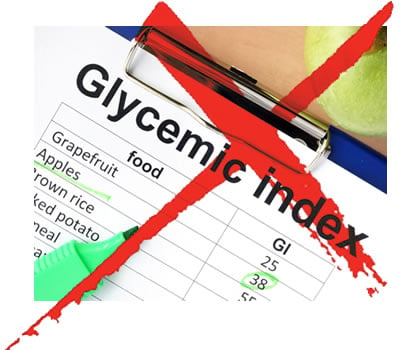
In this well-designed trial, scientists from Harvard, Johns Hopkins, and other research universities analyzed what happened to people who ate foods that had similar carbohydrate content but varied in how much they raised blood glucose. The effects of this property, called the glycemic index, on risk factors for cardiovascular disease “are not well understood,” wrote the authors. In this trial, they attempted to find out.
For five weeks, 163 overweight adults with cardiovascular concerns like hypertension were given 4 different diets that contained all of their meals, snacks, and beverages. Each diet was based on a healthful diet, like Pritikin and DASH (Dietary Approaches To Stop Hypertension), but some of the diets contained carbohydrates with a high glycemic index, such as potatoes, while others focused on carbs with a low glycemic index.
Measured were each diet’s effects on risk factors for cardiovascular disease and diabetes, including insulin sensitivity, LDL cholesterol, HDL cholesterol, triglycerides, and systolic blood pressure.
No improvements with low-glycemic foods
In this five-week study, the scientists found that diets with a low glycemic index did not result in improvements in insulin sensitivity, lipid levels, or systolic blood pressure compared with diets with a high glycemic index. In the context of an overall healthy diet, “using glycemic index to select specific foods may not improve cardiovascular risk factors or insulin resistance,” concluded the authors.
In fact, the diet high in carbohydrates and with a higher glycemic index (the diet that included potatoes) actually modestly improved both insulin sensitivity and LDL cholesterol levels compared to the lower glycemic index group.
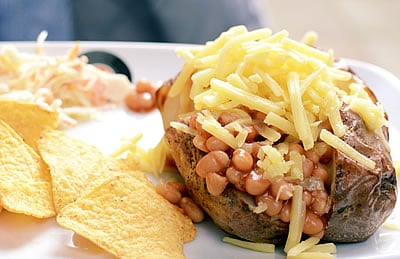
What does history tell us?
In the 19th century, Irish peasants ate a diet in which about 90% of their total calories came from potatoes, yet finding an obese Irish peasant then was like finding the proverbial needle in a haystack.
Dr. Willett argues, however, that his data3 from more than 120,000 health professionals do in fact show a correlation between eating more potatoes and becoming overweight or obese. But it’s important to point out that these were American health professionals, and the time period studied was the late 20th century.
Heavily processed potatoes
These Americans, in effect, generally did not eat potatoes straight from the earth, like the Irish of the 19th century. These Americans were largely eating heavily processed potatoes in the form of French fries, chips, or Pringles. And the whole potatoes they did eat, such as mashed or baked potatoes, tended to be loaded with artery and waistline killers like butter, salt, and sour cream.
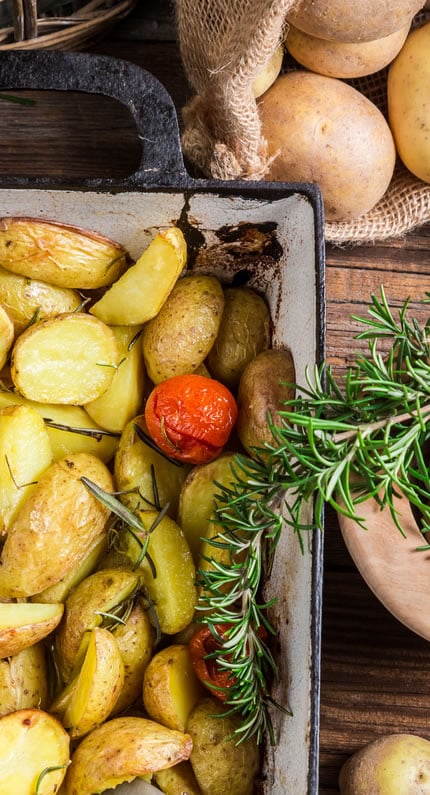
So the correlation between eating more potatoes and being more likely to gain weight is likely confounded by the fact that few Americans these days ever eat plain baked or boiled potatoes, as Penn Jillette did, to lose 100 pounds.
Correlation, as they say, does not necessarily prove causation.
But that hasn’t stopped numerous low-carb diet advocates from citing Dr. Willett’s questionable ideas about potatoes and high glycemic foods, and echoing his assertion that potatoes promote overeating because they increase blood sugar and insulin levels.
Potatoes: #1 in satiety
But the simple fact is, higher levels of insulin and sugar in the blood often result in people feeling more satiated, not less. When S.A. Holt of the University of Sidney, Australia, examined4 how much satiety (feelings of fullness) people felt after consuming a set number of calories from various food items, she found that a plain potato had the highest satiety index (SI) score of all the individual foods tested. The humble potato produced far more satiety per calorie than did fish, chicken, lean meat, or even beans.
Moreover, the satiety index produced by “… boiled potatoes … was seven-fold higher than the lowest satiety index score of the croissant …. .”
Bottom Line | Eating Potatoes and Losing 100 Pounds
Penn’s unconventional approach to weight loss worked for Penn, but it does not mean that eating only potatoes will make excess pounds magically disappear for everyone.
However, Penn’s experience does confirm Dr. Holt’s research showing that the humble potato does in fact provide more satiety per calorie than most other foods, including lean meat, fish, yogurt, and eggs.
It is a tremendous disservice to the millions of people worldwide who are trying to lose weight that some health professionals still cling to the theory that high-glycemic foods like potatoes promote weight gain and disease. This theory, science5 has shown, seems to be without credible scientific merit.
This theory, sadly, takes away some of the very foods that could help people lose weight successfully and long-term.
Potatoes may not be a “perfect food” (what food is?), but they certainly can be used as a healthy addition to any diet designed to aid weight loss and lower blood pressure and other cardiovascular risk factors.
Hopefully, Penn Jillette’s experience will help turn any notion that potatoes promote obesity and disease into a vanishing act.
Lose Weight at the Pritikin Weight-Loss Resort
Take life to the next level, and be all that you can be. That’s what a vacation at Pritikin is all about. Live better. Look better. And best of all, feel better.
All-Inclusive Resort

Get All the Details of a Stay at the Pritikin Center in Your Inbox
Sources
- 1 Jillette, Penn. Presto!: How I Made Over 100 Pounds Disappear and Other Magical Tales. Simon & Schuster, 2016.
- 2 JAMA, 2014; 312 (23): 2531.
- 3 New England Journal of Medicine, 2011; 364: 2392.
- 4 European Journal of Clinical Nutrition, 1995; 49 (9): 675.
- 5 American Journal of Clinical Nutrition, 2002; 76 (1): 290S.
Wellness Resort
Weight Loss Retreat
Health Spa